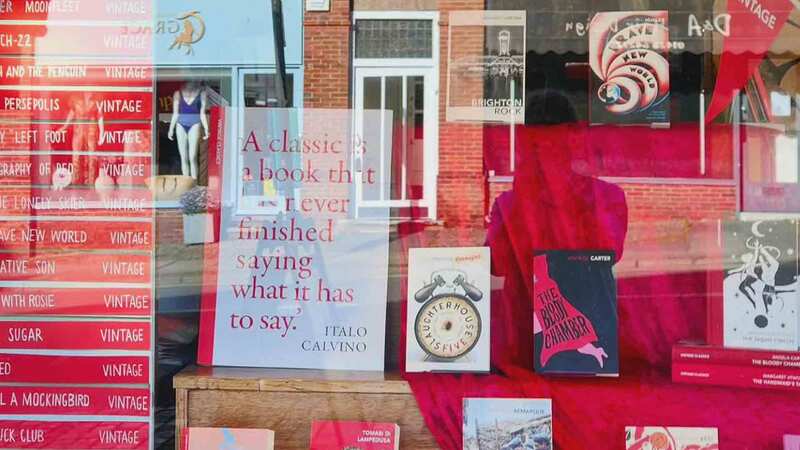You are viewing your 1 free article this month. Login to read more articles.
Physical retailers’ value to the trade has been heightened by pandemic, says Daunt
In an exclusive interview with The Bookseller, Waterstones m.d. James Daunt says the chain is set to reopen in England on Monday, and he does not anticipate heavy long-term damage.
The lockdown has proved the value of booksellers, Waterstones m.d. James Daunt has told The Bookseller ahead of the reopening of its English shops next week. In an interview, Daunt said that he did not think there would be any “permanent” damage to the high street bookshop chain once it was able to open its doors fully to customers, and that returns should not be a major issue for the chain, with stock taken from stores during the lockdown to fulfil website orders.
Daunt’s rallying cry came on the eve of the unlocking of a whole of range of non-essential retailers on Monday (15th June), with Waterstones to open the “vast majority” of its stores in England next week, following Ireland this week. Its shops in Scotland and Wales are to reopen once their devolved governments confirm dates.
Daunt said he did not “see any permanent damage” to the business post-lockdown, assuming Covid retreats, though he admitted trading would be slow initially. “I don’t believe there is anybody who buys books from Waterstones who didn’t also already buy books online, so I don’t see a permanent change in that respect.”
The comment will alleviate industry concerns about what many fear will be a sustained shift away from high street bookshops post-lockdown, with a consequent impact on the types of books that break through. Daunt said the lockdown has shown the value of bookseller recommendation and discoverability, with the mix of books that has sold since the end of March, including from Waterstones’ own website, more predictable.
“If customers are deprived of genuine bookseller engagement, then it is the more predictable books that will sell and new talent will find it harder to flourish. There will be some on the extremes of publishing that will think that the high street now has less relevance, but I think for most publishers, and in particular for the larger consumer-facing publishers, the strengths of what we do have never been more evident.
“What has sold since the closure of all shops has a been a different mix of books. Clearly sales have been sustained, but with a very different tone to them—[mostly] titles our customers already know about. What we have lost has been that element of discovery. So this period of lockdown has perhaps re-emphasised the importance of physical bookshops, and I’m sure publishers that are in the game of selling as many books as possible, and who want to discover and nurture new talent, understand what our side brings to the table.”
Taking precautions
Daunt said staff had already begun working to prepare stores, with personal protective equipment available, as well as sneeze-guards, hand sanitisers and styluses for those paying by card who have to enter a pin number, as an alternative to contactless payment. He said store furniture had been re-arranged to manage the throughput of customers, but added that the quiet season would make social distancing easier to facilitate. “We are trying to manage the flow in and flow out with furniture, so the shops will look a bit different, but not hugely. Much of what we are doing is intuitive. We have got very good processes and all the equipment is in place—hand sanitisers, for example—so I’m confident about that. We’ll set up the shops a few days in advance, and it’ll be a case of waiting to see how many customers return.”
Daunt confirmed that staff were returning to work in waves, with regional managers and store managers already working to prepare the bigger shops for reopening. But he added that if staff were vulnerable or lived with vulnerable family members, they would be able to remain on furlough.
On the pressure to close the chain in late March, Daunt said it “was wholly led by social media and authors”, stressing that there was no internal campaign to shut. “Authors have every right to feel indignant on behalf of perceived injustices within the company. Should we be concerned about the safety of our staff? Yes, of course we should, but were we reckless dealing with our staff and did we have a staff rebellion on our hands? No. As long as you’ve got really good processes in place, which we have, then we should get our shops open. But we are also respectful of those [employees] who cannot return.”
Daunt said he did not expect to see sales return to pre-lockdown levels immediately, with experience from Barnes & Noble in the US suggesting that around 60% of business would return, and then grow from there. “Being down about 40% is the worst anyone has done. B&N is very rapidly getting back to business.” He also cautioned not to expect a bounce-back. “I think we will have lost forever that portion of our sales while we were closed, there is going to be no rebound in the way you can normally expect if there is disruption. All of these lost sales generally come back, but that isn’t going to be the case now. For us and most independents, the end of the March, April and May sales are gone, and that’s a huge financial hit. It’ll also take a while to get back to normal, so there will be a further loss through the following months.”
Second winds
Daunt said there would be a new life for books published during the lockdown, and that he did not expect to see huge returns, thanks in part to orders fulfilled through store-stock from its website. “Waterstones has had a reasonably large online operation so we have been working through our stock, and have actually re-ordered. We have taken stock out of shops to meet that demand. But the new and peculiar books, and the kind of titles that we would have expected to push in store, have not sold. But if it was a new book back in March, then it will still feel new in June. It doesn’t have March or May stamped on it, like milk. We won’t be supported by reviews, but we’ll still have bookseller recommendations, and our booksellers will pick up where they left off. The returns problem, at least for Waterstones, will be relatively minor.
Daunt said he was looking forward to those first few days: “We have got some nice big books that are waiting for us when we return, and some that came out in the interim and haven’t yet had a lease of life in the shops yet—[Philippe Sands’] The Ratline for example: it’ll be huge within our shops, even though it has done well online. There’s plenty to sell. I’m optimistic in that sense; also customers will come in and ask what they have missed. Bookselling can be a very intimate relationship, but now we’ll be bellowing across the shop. We may find it a much more efficient way of influencing what people buy.”
Daunt said he did not anticipate any big changes to the estate, except in cases where the rent “becomes ludicrously high”. He added: “The estate will remain relatively stable and we’ll continue to open shops. While I don’t wish ill-will on other retailers, there will be, as a result of this, more empty shops to fill.”
Overall, he was positive about continued support from parent Elliott Advisors, which during the lockdown increased its exposure to the book business with the acquisition of Wordery from Bertrams. “Elliott will be slightly irritated that we lost so much money during the closures, but the business will get back to where it was, and it was a very good business. Elliott will still sell us, and I’m sure profitably, but perhaps a bit later than it might have done otherwise.”
Dot com boom
Daunt praised the performance of Waterstones.com during the lockdown, which has had to scale up quickly since the end of March. “The pandemic has tested our ability to operate at a higher scale. We struggled immediately, but we very quickly got on top of it, and I am pleased about that.”
He also referenced the US e-book operation Nook, part of Barnes & Noble. “Evidently it has been helped by the pandemic, but things have turned around for Nook. The perception that I am anti-e-books is wrong. I am very in favour of them if I can sell them, and I have not been able to do that [in the UK]. One of the things where I differ from my immediate predecessor at B&N is that I consider the ability to sell e-books to be a great strength, and the company had stopped investing in Nook. That will change. We will make Nook very much part of what we do [in the US].”
He said questions about selling e-books in the UK had been parked during the coronavirus crisis, but added that it would be looked at again. “I wouldn’t hold your breath, but all other things being equal, it is something we should aspire to do. We sell an awful lot of e-books in the US.”













